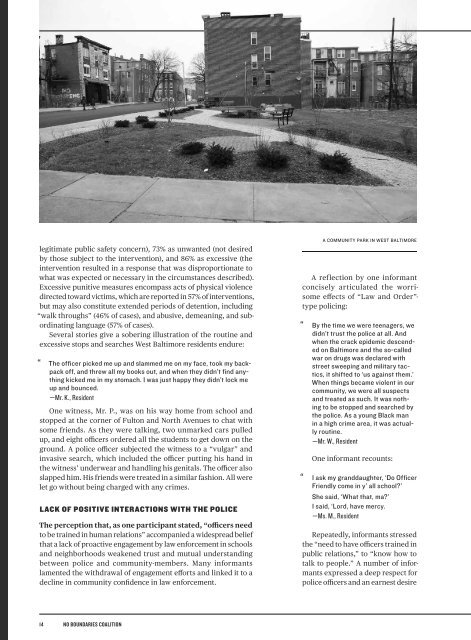OVER-POLICED YET UNDERSERVED POLICE MISCONDUCT IN WEST BALTIMORE
No-Boundaries-Layout-Web-1
No-Boundaries-Layout-Web-1
Create successful ePaper yourself
Turn your PDF publications into a flip-book with our unique Google optimized e-Paper software.
legitimate public safety concern), 73% as unwanted (not desired<br />
by those subject to the intervention), and 86% as excessive (the<br />
intervention resulted in a response that was disproportionate to<br />
what was expected or necessary in the circumstances described).<br />
Excessive punitive measures encompass acts of physical violence<br />
directed toward victims, which are reported in 57% of interventions,<br />
but may also constitute extended periods of detention, including<br />
“walk throughs” (46% of cases), and abusive, demeaning, and subordinating<br />
language (57% of cases).<br />
Several stories give a sobering illustration of the routine and<br />
excessive stops and searches West Baltimore residents endure:<br />
““<br />
The officer picked me up and slammed me on my face, took my backpack<br />
off, and threw all my books out, and when they didn’t find anything<br />
kicked me in my stomach. I was just happy they didn’t lock me<br />
up and bounced.<br />
—Mr. K., Resident<br />
One witness, Mr. P., was on his way home from school and<br />
stopped at the corner of Fulton and North Avenues to chat with<br />
some friends. As they were talking, two unmarked cars pulled<br />
up, and eight officers ordered all the students to get down on the<br />
ground. A police officer subjected the witness to a “vulgar” and<br />
invasive search, which included the officer putting his hand in<br />
the witness’ underwear and handling his genitals. The officer also<br />
slapped him. His friends were treated in a similar fashion. All were<br />
let go without being charged with any crimes.<br />
LACK OF POSITIVE <strong>IN</strong>TERACTIONS WITH THE <strong>POLICE</strong><br />
The perception that, as one participant stated, “officers need<br />
to be trained in human relations” accompanied a widespread belief<br />
that a lack of proactive engagement by law enforcement in schools<br />
and neighborhoods weakened trust and mutual understanding<br />
between police and community-members. Many informants<br />
lamented the withdrawal of engagement efforts and linked it to a<br />
decline in community confidence in law enforcement.<br />
A COMMUNITY PARK <strong>IN</strong> <strong>WEST</strong> <strong>BALTIMORE</strong><br />
A reflection by one informant<br />
concisely articulated the worrisome<br />
effects of “Law and Order”-<br />
type policing:<br />
““<br />
By the time we were teenagers, we<br />
didn’t trust the police at all. And<br />
when the crack epidemic descended<br />
on Baltimore and the so-called<br />
war on drugs was declared with<br />
street sweeping and military tactics,<br />
it shifted to ‘us against them.’<br />
When things became violent in our<br />
community, we were all suspects<br />
and treated as such. It was nothing<br />
to be stopped and searched by<br />
the police. As a young Black man<br />
in a high crime area, it was actually<br />
routine.<br />
—Mr. W., Resident<br />
One informant recounts:<br />
““<br />
I ask my granddaughter, ‘Do Officer<br />
Friendly come in y’ all school?’<br />
She said, ‘What that, ma?’<br />
I said, ‘Lord, have mercy.<br />
—Ms. M., Resident<br />
Repeatedly, informants stressed<br />
the “need to have officers trained in<br />
public relations,” to “know how to<br />
talk to people.” A number of informants<br />
expressed a deep respect for<br />
police officers and an earnest desire<br />
14 NO BOUNDARIES COALITION


